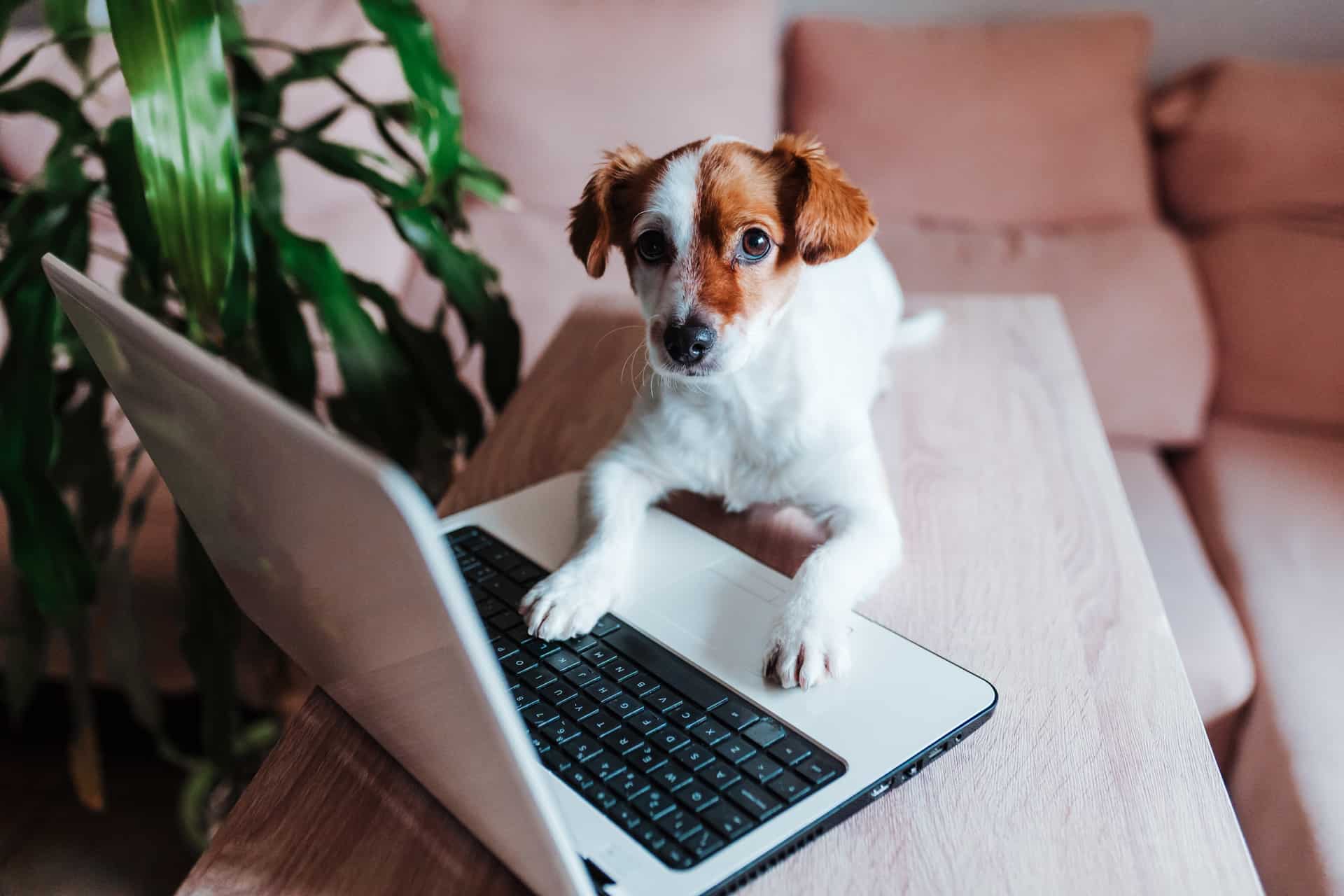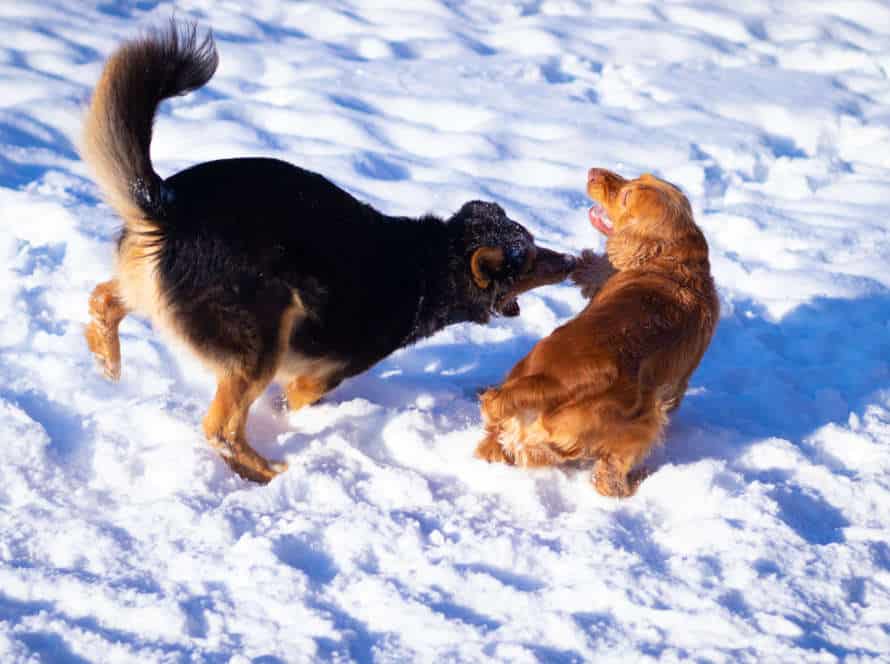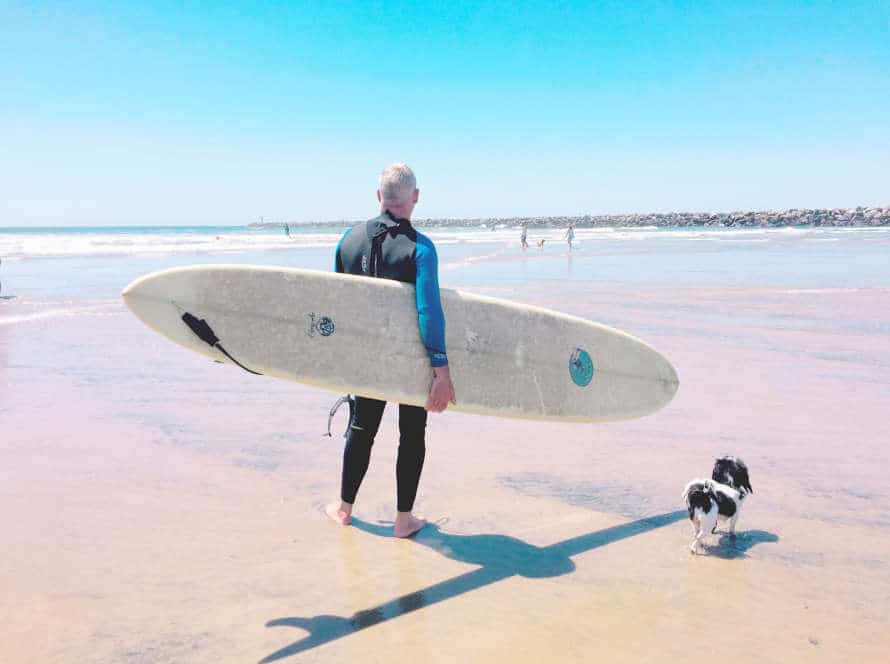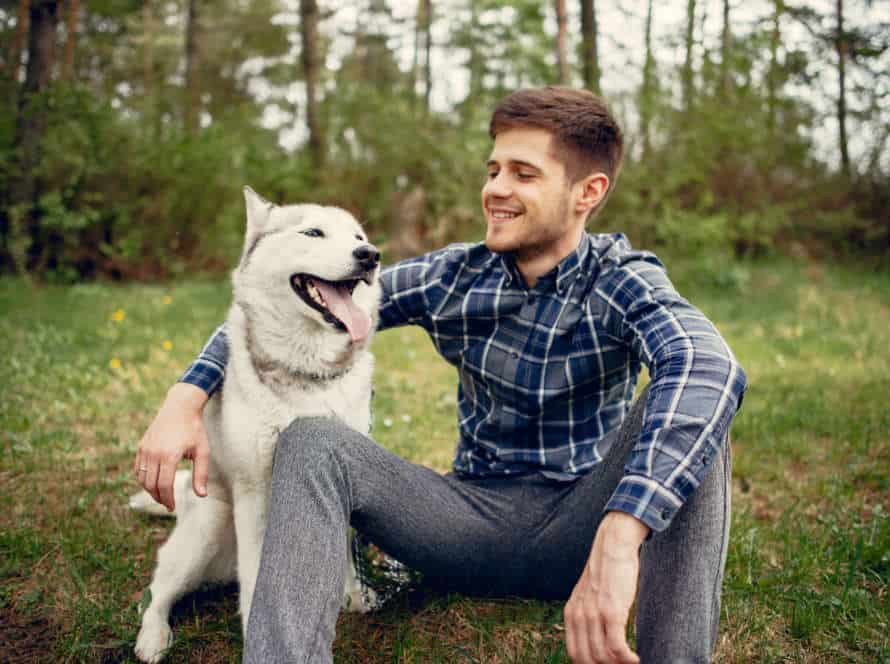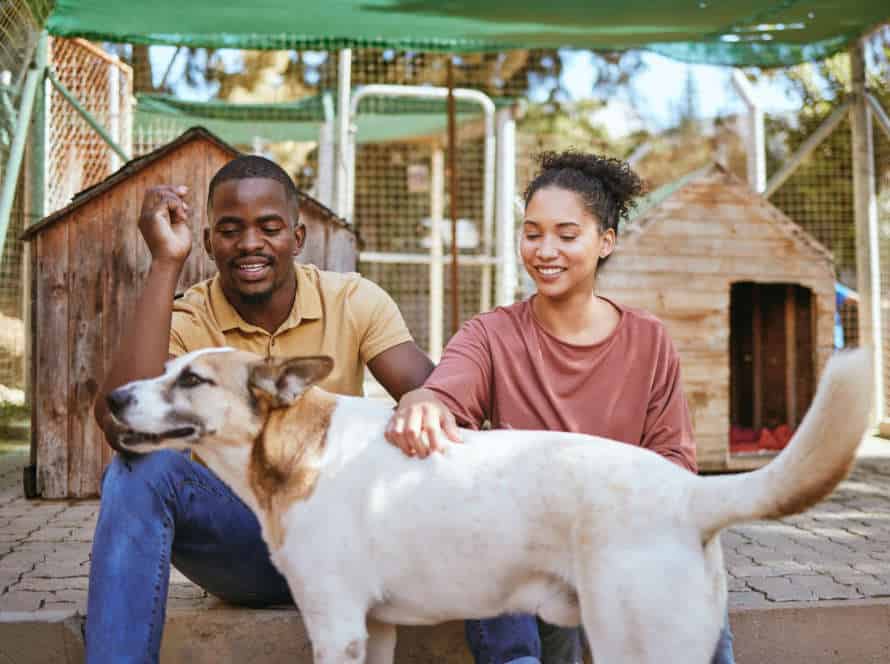The Science Behind Puppy Socialization
Puppy socialization is essential. It involves introducing them to different people, other dogs, and experiences at a young age.
Why is it important? Puppies are in a key developmental stage between 3 to 14 weeks. During this time, they learn how to interact with their environment and build their social skills.
Studies suggest numerous advantages from socializing puppies during this window, like better adaptability, decreased fear, and greater resilience to stress.
Plus, it helps create positive connections with people, other pooches, and their environment, leading to more contented and well-adjusted pup pals in the future.
Importance of Puppy Socialization
Puppy socialization is key! It helps your puppy’s physical and emotional health. Teach your pup that being around people, animals, and new environments is a good thing. This helps create an emotionally balanced, well-adjusted adult dog. Let us explore the science of puppy socialization further.
Benefits of Puppy Socialization
Socializing your pup is vital for their overall growth – physically and emotionally. It comes with many advantages.
Puppies should be exposed to different situations, people and animals during puppyhood. This shapes how they act and interact with the world around them.
Here are 4 benefits of puppy socialization:
- Fear & Anxiety Reduction: Socialized puppies are less likely to be anxious, fearful and aggressive towards other animals and people.
- Improved Health: Proper socialization boosts their immune system and minimizes the risk of illnesses.
- Better Adaptability: Socialized puppies can adapt to new environments and situations more easily.
- Training Made Easier: Socialized puppies are easier to train as they are more responsive to commands and experiences.
Socialization should start early – between 3 and 14 weeks of age – and continue in their early years. Pro Tip: Enroll your puppy in a socialization class or set up regular playdates with other puppies to give your pooch plenty of chances to socialize and interact in a positive way.
Risks of Inadequate Socialization
Inadequate socialization in puppies can have long-lasting effects. They need to learn how to interact with other dogs and humans.
Risks of inadequate socialization include:
- Fear and anxiety. This can lead to aggression or anti-social behavior.
- Health problems like obesity, diabetes, and heart disease.
- Difficulty training them.
Therefore, it’s important to expose pups to different people, animals, and environments. This helps them develop confidence, communication skills, and emotional resilience – all of which will help them later in life.
Critical Periods for Puppy Socialization
Puppy socialization is essential for young pup’s growth. It involves introducing them to different environments, people, and experiences for them to learn how to adjust to the world around them.
There are three key times during a pup’s life where socialization is very important for them to grow into a mature dog:
- First: 3 to 5 weeks old. At this point, pups become aware of their environment and start developing their social skills. Showing them new sights, sounds, and smells is important.
- Second: 5 to 12 weeks old. This is the most important time for puppy socialization as they form long-term impressions and links to other animals, people, and the environment.
- Third: 3 to 6 months old. During this period, they start to lose some baby teeth and adult teeth start to grow. It is essential to introduce them to different textures and objects to help them build their bite strength and habits.
By socializing properly in these critical periods, pups can grow into well-adjusted and confident adult dogs.
Understanding Puppy Behavior
Puppies are social animals. They need contact with other puppies and humans to learn how to socialize. This period of socialization is vital for puppies, as it helps them understand how to interact with other creatures and people. Let us explore the science of puppy socialization and its effect on their behavior.
Puppy Development Stages
Puppies progress through many stages, each with its own traits and habits. Knowing these phases is important for teaching and making your pup friendly.
- Phase 1: The newborn stage (0-2 weeks) – During this time, pups are without sight, hearing, and can’t control their temperature. They totally rely on Mom for survival.
- Phase 2: The switchover period (2-4 weeks) – Puppies start to sense and become more active. They start practicing walking and exploring.
- Phase 3: The socialization period (4-12 weeks) – This is vital for a puppy’s emotional and behavioural growth. They learn to interact with other dogs and people and acquire abilities like bite control.
- Phase 4: The juvenile period (3-6 months) – Pups keep growing and learning during this time. They may be more independent but still need guidance and education.
- Phase 5: Adolescence (6-18 months) – Pups may act up more in adolescence as they try to be independent. Constant training and socializing is necessary during this phase.
Pro tip: Socializing your pup during the 4-12 week critical period can help avert later behavioural issues and create a well-adjusted, interactive pup.
Socialization Techniques
Socializing a puppy is key. It helps them develop healthy habits and helps them overcome fears and anxiety. There are different ways to do this:
- Controlled experiences: Introduce the puppy to different textures, sounds and smells in a secure environment. Rewards for good behavior.
- Frequent social interactions: Take the puppy to places like dog parks, pet stores and friends’ houses so they can learn to interact with other animals and people.
- Positive reinforcement training: Reward good behavior with treats and praise to help them gain confidence.
- Gradual exposure: Expose the puppy to new people, places and situations gradually to avoid overwhelming them.
Starting socialization early is very important. It will give the puppy a better life and create a long-term, happy relationship between the owners and their pet.
Factors Affecting Socialization
Puppy socialization is extremely important for their development. Different factors can greatly affect their socialization.
- Age: Initial months are significant for socialization. Experiences then shape their behaviour permanently.
- Environment: Growing up in the right environment is key. Exposure to people, animals, and stimuli in a positive environment helps them become well-adjusted.
- Genetics: Temperament is largely influenced by genetics. If parents had behavioural issues, pups are likely to too.
- Health: Physical and mental health also plays a role. Health issues can limit socialization with people and other dogs.
So, it’s essential to create a positive and controlled social environment in the first months. Plus, be aware of the influence of genetics, environment, and health.
The Role of Positive Reinforcement
Positive reinforcement has a big role in puppy socialization. This article explains how it works and the science behind it. Understand the process, what it does to behavior, and remember these key points when using it. Get ready to learn about positive reinforcement!
Examples of Positive Reinforcement
Positive reinforcement is a way to train your pet. It involves rewarding good behavior. Here are some examples:
- Verbal praise: Tell your puppy “good boy” in a nice tone when they do something good.
- Treats: Give a small, healthy treat when they do something right. This will motivate them to repeat the behavior.
- Playtime: Spend time with your puppy and play with them. This will help them associate good behavior with fun.
- Affection: Give your puppy love and affection when they behave well.
Remember: Be consistent with rewards and be patient. Pro tip: Positive reinforcement builds a strong bond between pets and owners.
Using Rewards to Encourage Social Behaviors
Positive reinforcement is a mighty tool to encourage puppies’ social behavior, making them better-tempered and obedient. By rewarding good deeds, they’ll be more likely to do desired actions again in the future.
Here are some tips to socialize your pup with rewards:
- Give small, delicious treats right after they do the desired behavior. This positive reinforcement will help them link the action to the treat.
- Praise and give attention to them when interacting with other dogs or people.
- Reward them with treats for tolerating and adapting to unfamiliar environments, like a vet visit or car ride.
- Consistency is key – consistently and predictably offer positive reinforcement to build lasting social behaviors in your pup.
Reinforcing Good Behavior to Prevent Fear
Positive reinforcement is an effective way to keep puppies from feeling scared or anxious. This involves rewarding good behavior to make sure a pup does it again. Here are some tips to reinforce good behavior and socialize your pup:
- Give treats and compliments when your puppy performs desirable behaviors like sitting, staying, and responding to their name.
- Instantly reward pup when they do something good, to make a strong connection.
- Don’t use punishment or negative reinforcement, which can scare or worry your pup.
- Expose your pup to different social situations and environments, such as meeting new people, animals and noises, to build confidence and stop fear.
- Consistency is important – make sure all family members and caretakers use the same positive reinforcement techniques.
With consistent positive reinforcement and socialization, your puppy will grow into a confident and well-adjusted adult dog.
Socialization Activities for Puppies
Socializing pups is a key part of being a responsible pup-parent. Without the right socialization, puppies can have behavioural issues and be scared of people and other animals. Science can help us understand the best methods and activities to use for socializing puppies. Here we’ll look at some awesome activities to help your pup become a balanced and confident pup-pal!
Introducing Puppies to New People
Introducing puppies to new people is essential for their socialization process. It helps build confidence & can improve their behavior. Socializing puppies early on can prevent future behavior problems. Here are some activities:
- Invite different people to come over & get your pup used to strangers.
- Take your pup for a walk through public places like parks, dog-friendly cafes, or stores.
- Enroll your pup in a training class to meet & interact with other puppies.
- Introduce your pup to people of all ages & backgrounds.
It’s important to give your pup positive reinforcement when exposing them to new people. Pro tip – Make sure their vaccinations are up to date!
Exposing Puppies to New Environments
Socializing puppies is essential for their well-being. It boosts their social skills and prepares them for interactions with other animals and people. Here are some activities to expose your puppies to new surroundings:
- Introduce them to different textures, like soft blankets, hard floors, grass and sand.
- Take them to parks or busy roads to let them hear new noises like music or household sounds like the vacuum cleaner.
- Help them socialize with other dogs and people of all ages, sizes and genders.
Pro Tip: Begin socializing your puppies when they are 3-4 weeks old and continue until they are 4-5 months old. Make sure the socialization sessions are brief and pleasant. Don’t force your puppy into uncomfortable scenarios.
Building Confidence Through Play
Playing is key for socializing pups and boosting their self-confidence! Here are some activities to help your pup become a well-rounded adult.
- Puppy socialization classes: Perfect for socializing puppies with other dogs and people. Enroll when they’re between 7-14 weeks old.
- Playdates: Arrange playdates with other puppies or well-behaved adult dogs to teach your pup valuable social skills.
- Enrichment toys: Toys that offer treats or have different textures and sounds to help your puppy build confidence and reduce stress.
- Novel experiences: Introduce your pup to new things, like the park or meeting new people. This’ll help build confidence and reduce anxiety in strange situations.
Socializing your pup early is important for a content and happy doggo. It teaches them to interact with other canines and people in a positive way. So, start between 7-14 weeks of age to help them develop healthy social skills for life!
Overcoming Common Socialization Challenges
Socialization is essential for raising a puppy right. But some puppies face challenging situations that make it hard. This part looks into the science of puppy socialization and how to tackle common issues.
Addressing Fear and Anxiety in Puppies
Socialization is critical for a pup’s wellbeing. Here are some tips to help them address fears and anxieties:
- Gradual Exposure – Introduce puppies gently and one step at a time. This helps them adjust without becoming overwhelmed.
- Socialization Classes – Enroll them in a supervised setting where they can interact with other dogs and people.
- Positive Reinforcement – Reward their good behavior with treats, toys, and praise.
- Calming Environment – Give them a safe and secure place to relax, such as a crate or quiet room.
- Seek Professional Help – If their fears and anxieties worsen, seek help from a vet or professional dog trainer.
- Pro Tip – Early socialization is key. Through positive reinforcement and gradual exposure, owners can help their pup become confident.
Helping Puppies Overcome Trauma
Puppy socialization is very important for teaching them proper behavior and building good relationships with people and animals. Sadly, traumatic events can hold back socialization. But you can help your pup overcome their trauma and have a healthy life. Here are some tips:
- Start slow – feed near new people/animals. Increase exposure gradually.
- Positive reinforcement – use treats and praise when pup shows good social engagement.
- Consistency – create a routine so pup knows what to expect.
- Patience – give pup time to adjust. Don’t force them into uncomfortable situations.
With these tips, your pup can overcome trauma and develop positive social habits.
Correcting Negative Behaviors with Positive Reinforcement.
Positive reinforcement is a great way to fix negative behavior in puppies while they’re socializing. Replace bad actions with good ones and they can learn how to act in different social settings.
Here’s how it works:
- Identify the behavior that needs to be fixed.
- Show the pup what you want them to do.
- Reward them with a treat or praise for doing it right.
- Keep repeating the process to connect the good behavior with positive feelings.
- Eventually the puppy will naturally replace the bad behavior with the good. This helps puppies feel more confident and emotionally healthy, so they’ll be great grown up dogs.
Frequently Asked Questions
Q: What is puppy socialization?
A: Puppy socialization is the process of exposing puppies to a variety of experiences, people, animals, and environments in order to help them develop into well-adjusted and confident adult dogs.
Q: Why is puppy socialization important?
A: Puppy socialization is important because it helps puppies learn how to interact with their environment and establish positive relationships with people and other animals. It also helps prevent behavioral problems and can improve a puppy’s overall quality of life.
Q: When should I start socializing my puppy?
A: Puppies should start socializing as early as possible, ideally between the ages of 3 and 14 weeks. This is when they are most receptive to new experiences and are still forming their view of the world.
Q: How do I socialize my puppy?
A: There are many ways to socialize a puppy, including exposing them to new sights, sounds, smells, and textures, introducing them to different people and animals, and taking them to new environments such as parks or cities.
Q: Can I socialize my puppy on my own, or do I need professional help?
A: While it is possible to socialize your puppy on your own, professional help can be beneficial. A professional trainer or behaviorist can provide guidance on the best ways to socialize your puppy and help you identify any potential issues early on.
Q: What are some common mistakes to avoid when socializing my puppy?
A: Some common mistakes to avoid include overwhelming your puppy with too much stimuli at once, forcing them to interact with other animals or people, and punishing them for being fearful or anxious. It is important to go at your puppy’s pace and make sure they feel safe and comfortable throughout the socialization process.

